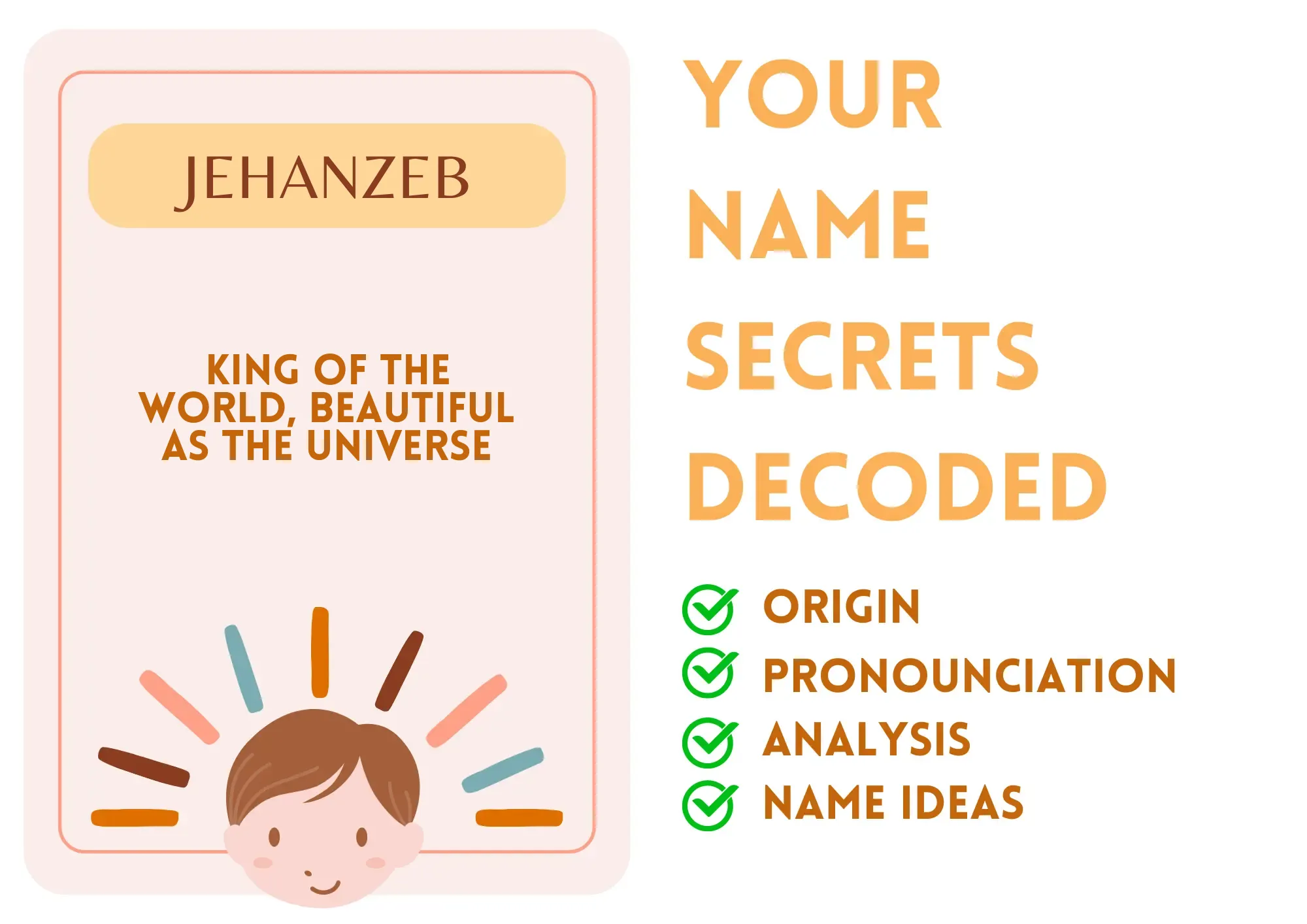
Jehanzeb
Jehanzeb is a culturally rich name of Persian and Urdu origin, meaning 'king of the world' or 'one who is beautiful as the universe.' It is predominantly used among Muslim communities and carries a regal connotation. The name reflects historical significance in the Mughal Empire, often associated with nobility and grandeur.
Jehanzeb is generally perceived positively, evoking feelings of beauty, nobility, and charm. It is fairly easy to write and pronounce, though it might be challenging for non-native speakers, leading to variations in pronunciation.
In popular culture, while the name isn't commonly featured in mainstream media, its historical roots often inspire characters in literature and artistic renditions. It holds a significant place within contemporary South Asian culture, appreciated for its elegance and meaning.
Basic Information
Gender: Boy
Sounds Like: JAY-han-zeb
Pronunciation Explanation: The name is pronounced with emphasis on the first syllable, 'JEH', followed by 'han' sounding like 'hun' without a strong emphasis, and ending with 'zeb' as in 'zebras'.
Summary and Meaning
Meaning: king of the world, beautiful as the universe
Origin: The name Jehanzeb has Persian and Urdu origins, signifying its deep-rooted connections to the Mughal Empire and Islamic heritage.
Usage: Jehanzeb is traditionally a masculine name, commonly given to boys to bestow regal and noble qualities.
Name Number (Chaldean)
Name Number (Pythagorean)
Popularity (Global Rank)
Overall: 29754
Boys: 21974
Most Popular in
Religious and Cultural Significance
Religion: Islam
Background: In Islamic culture, the name carries noble associations and is often selected for boys due to its grandeur and representation of beauty.
Cultural Significance: Jehanzeb is appreciated for its historical resonance, reflecting virtues of beauty and leadership, making it popular among families wishing to impart significant cultural values to their children.
Historical Significance: The name Jehanzeb holds historical importance related to the Mughal Empire, symbolizing the beauty and nobility associated with emperors, particularly Jahangir, known for his artistic patronage and love for nature.
Popular Culture
Literature and Mythology: While Jehanzeb may not frequently appear in popular literature, its variants or inspired names can often be found in tales of royalty and historical narratives.
Movies and Television: The name is sometimes referenced in historical drama series set in the Mughal era, embodying characters representing prestige and beauty.
Feelings and Perceptions
Perception: Jehanzeb is generally viewed positively, associated with nobility, beauty, and strength. It resonates well with those who appreciate rich cultural histories and meanings.
Positive Feelings: Regal, charming, captivating, culturally rich, significant.
Negative Feelings: Some may find it overly long or complex to spell.
Practical Considerations
Ease of Writing and Calling: The name Jehanzeb, while flowing and beautiful, might be perceived as slightly lengthy, making it a bit more challenging to pronounce for some individuals unfamiliar with similar sounds; however, it is not overly complicated.
Common Typos and Misspellings: Jehanzab,Jehenzeb,Jihanzeb,Jehenzab
Common Nicknames: Jehan,Zeb,Jey
Jehanzeb Popularity
Jehanzeb Usage and Popularity By Country
| Country | Rank (Overall) |
|---|---|
| Pakistan | 878 |
| Liberia | 3221 |
| Saudi Arabia | 5689 |
| United Arab Emirates | 6074 |
| Oman | 7820 |
| Qatar | 9970 |
| Iraq | 12134 |
| United Kingdom | 17722 |
| Canada | 26422 |
| Germany | 27005 |
Jehanzeb Usage and Popularity By City
| City | Rank (Overall) |
|---|---|
| Lahore | 690 |
| Peshawar | 387 |
| Rawalpindi | 794 |
| Multan | 1254 |
| London | 25094 |
| Washington | 15161 |
| Hyderabad | 1491 |
| Toronto | 17131 |
| New York | 39655 |
| Peshawar | 1430 |
Compatibility Analysis
Famous Persons Named Jehanzeb
No results found for Jehanzeb.
Related Names
Similar Sounding Names:
Jahangir,Jahan,Zebedee,Jazib